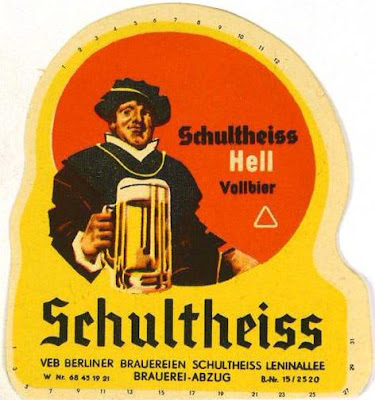While there's a smattering of German beers from before and after the war, for obvious reasons there's nothing for the years of the conflict. Short of getting my hands on a cache of brewing records from German breweries, I didn't see any way I could fill in that gap. But, thanks to Heineken, I can.
Because Heineken was so keen on keeping an eye on the products of competitors that they didn't let a little thing like a world-spanning conflagration get in the way of their industrial espionage. Before the horridness kicked off, they weren't just checking up on Dutch rivals. Having a big trade in the Far East, they were also spying on colonial brewers.
That all stopped after the German occupation. They did, however, analyse beers from one other country: Germany.
Where they acquired these beers is unclear. From adverts in Dutch newspapers, I know that German beer was available in some pubs in Holland. The ones frequented by the Germans and their local fascist mates. I'm guessing that somehow Heineken acquired some samples via this route. Not sure why they were so interested in German beer, as it wasn't really un direct competition with their products.
You can see that the war had impacted the strength of German beer. Especially bearing in mins this was the stuff brewed for the German armed forces. Civilians back home had to endure far more watery beer. Though it's around the same strength as the beer Heineken was brewing for the Dutch market. In June 1941 Heineken Pils was 10º Plato, early in 1942, 7.6º Plato.
If the Paulaner and Dortmunder Kronen from 1941 look suspiciously similar, it's probably because they are the same beer. It's noted that they were both bottled by the same bottler.
| German beer in WW II | |||||||||
| Date | Year | Brewer | Town | Beer | OG Plato | FG Plato | ABV | App. Atten-uation | Colour |
| 6th Mar | 1941 | Dortmunder Union | Dortmund | Dortmunder | 11.54 | 3.18 | 4.35 | 73.35% | 0.52 |
| 6th Mar | 1941 | Dortmunder Union | Dortmund | Pilsener | 10.03 | 2.83 | 3.73 | 72.59% | 0.48 |
| 6th Jun | 1941 | Paulaner | Munich | Helles | 9.86 | 2.46 | 3.83 | 75.78% | 0.52 |
| 6th Jun | 1941 | Dortmunder Kronen | Dortmund | Dortmunder | 9.86 | 2.46 | 3.79 | 75.78% | 0.52 |
| 9th Jun | 1941 | Dortmunder Union | Dortmund | Dortmunder | 10.09 | 2.21 | 4.06 | 78.78% | 0.48 |
| 5th Aug | 1941 | Schultheiss-Patzenhofer | Berlin | Pilsener | 10.66 | 2.39 | 3.76 | 78.31% | 0.5 |
| 27th Jan | 1942 | Janssen | Hamburg | Export Tafelbier | 11.31 | 3.12 | 4.24 | 73.30% | 0.4 |
| 27th Jan | 1942 | Dressla | Bremen | Export | 8.35 | 1.83 | 3.35 | 78.65% | 0.28 |
| 27th Jan | 1942 | Bavaria Brauerei | Altona | Pils | 10.01 | 2.02 | 4.11 | 80.46% | 0.4 |
| 27th Jan | 1942 | Schultheiss | Berlin | Helles | 8.24 | 2.56 | 2.90 | 69.63% | 0.4 |
| 27th Jan | 1942 | Schloss-Cabinet | Berlin | Export | 8.16 | 2.22 | 3.04 | 73.44% | 0.3 |
| 29th Jan | 1942 | Bavaria Brauerei | Altona | Export | 8.00 | 1.79 | 3.18 | 78.18% | 0.35 |
| 29th Jan | 1942 | Bavaria Brauerei | Altona | Export | 8.03 | 1.67 | 3.25 | 79.73% | 0.45 |
| 30th Jan | 1942 | Holsten | Bremen | Export | 10.04 | 2.28 | 4.03 | 77.99% | 0.3 |
| 30th Jan | 1942 | Beck | Bremen | Export | 8.62 | 2.24 | 3.26 | 74.67% | 0.3 |
| 13th Mar | 1942 | DAB | Dortmund | Export | 7.31 | 2.06 | 2.70 | 72.41% | 0.58 |
| 13th Mar | 1942 | Dünckler & Rüppert | Export | 7.27 | 1.85 | 2.75 | 75.10% | 0.38 | |
| Source: | |||||||||
| Rapporten van laboratoriumonderzoeken naar producten van Heinekenbrouwerijen in binnen- en buitenland en naar producten van andere brouwerijen held at the Amsterdamse Stadsarchief, document number 834 - 1794. | |||||||||











































































1 comment:
Based on the way they were divining German troop deployments from delivery stats, I'm not surprised they were analyzing German beers for any information they could get. They seem to have been a hyper-analytical place.
At a minimum, I wouldn't be surprised if they were double checking for evidence of German malt supplies to make sure they weren't being short changed.
Post a Comment